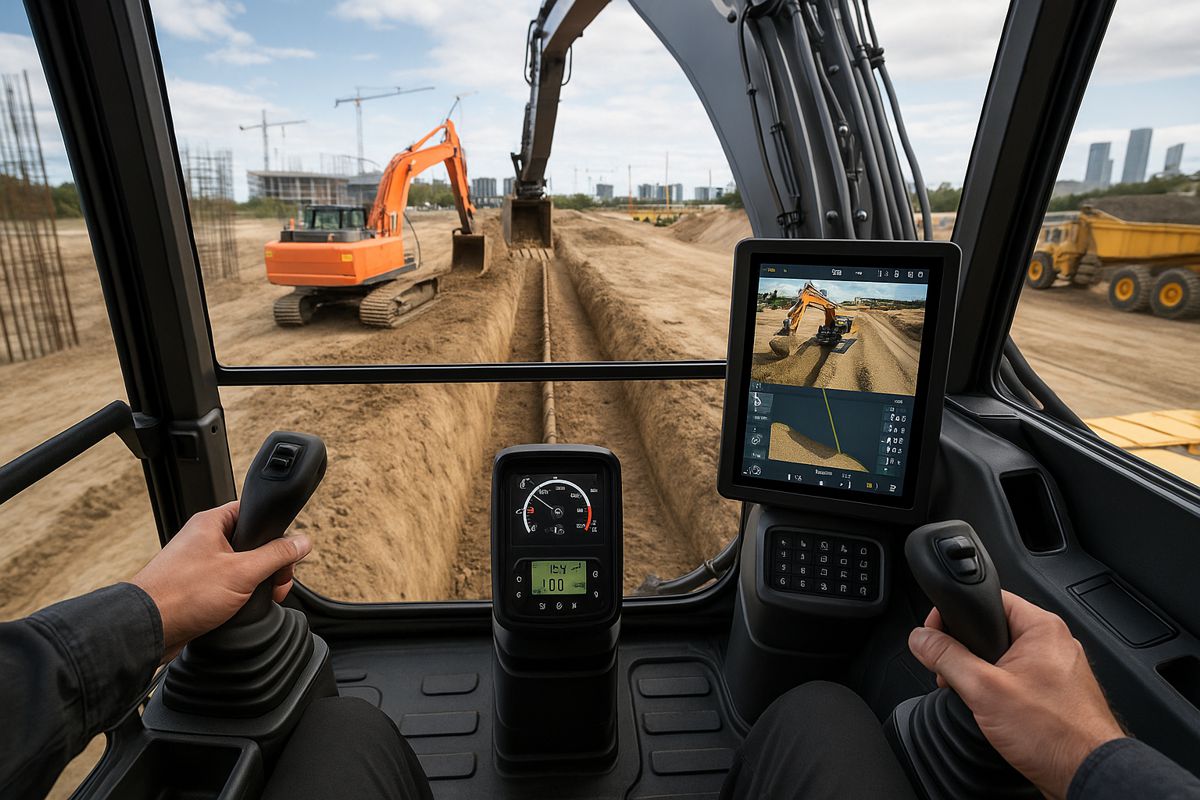Automation Empowering Asia’s Construction Workforce
Asia’s construction sector is in the midst of a profound transformation. Rapid urbanisation, ambitious infrastructure programmes, and an ageing workforce are reshaping how projects are delivered across the continent.
Contractors increasingly face a shortfall of skilled labour, particularly as experienced operators approach retirement and younger generations pursue more technology-focused careers. Against this backdrop, automation and digital technologies are not replacing human expertise but strengthening it, positioning the workforce for a more resilient and capable future.
Across the region, innovations in automation, connectivity, and remote operation are redefining day-to-day site activity. Digital ecosystems now enable people, machines, and data to interact in real time, supporting safer, cleaner, and more productive operations. When applied thoughtfully, such technologies don’t diminish the role of the operator. Instead, they amplify human insight and make construction more inclusive and sustainable.
Smarter Assistance Transforming Job Site Safety and Efficiency
Automation’s strongest early impact is seen at the machine interface, where intelligent systems are reshaping how operators work. Solutions such as Volvo Co-Pilot, Dig Assist, Load Assist, and Haul Assist offer intuitive digital support that improves accuracy, reduces fatigue, and boosts overall safety. These platforms provide real-time guidance, enabling both new and experienced operators to carry out tasks with greater precision.
Trainees particularly benefit from on-screen feedback that shortens the learning curve. Instead of relying solely on months of practical experience, new operators can quickly gain confidence through continuous digital prompts and automated support tools that minimise errors. Experienced professionals, meanwhile, gain efficiency improvements that enhance productivity across the entire site.
One of automation’s most important contributions lies in its ability to make machinery less physically demanding and easier to control. As a result, construction becomes more accessible to a wider range of people, including younger entrants and those previously deterred by the industry’s physical intensity.
This democratisation of opportunity will be crucial as Asia expands its infrastructure footprint. Smarter assistance fills critical skills gaps while enabling operators to work more safely and sustainably. The technology empowers individuals, supporting better decision-making and reducing the likelihood of accidents or costly rework.
Training Built for a Digital Construction Era
As machines become more intelligent, the expectations placed on operators evolve as well. Traditional training approaches are increasingly being complemented by digital learning platforms, simulators, and remote training technologies. Volvo CE has been at the forefront of this shift, deploying advanced simulators that replicate real-world job site conditions in a controlled, risk-free environment.
These simulators allow trainees to develop skills more efficiently without occupying live machines or causing downtime. The technology captures realistic scenarios, including varied terrain, unpredictable loads, and complex manoeuvres. By practising in these virtual spaces, operators gain familiarity with controls, safety protocols, and operational challenges before stepping onto an active site.
For contractors, this digital shift enables large-scale workforce development. Operators can be trained cost-effectively, safely, and consistently, without delaying projects or risking equipment damage. Remote learning also helps organisations reach trainees across geographically dispersed regions, ensuring access to high-quality instruction regardless of location.
This evolution in training aligns with Asia’s rapid technological development, ensuring the next generation of operators is equipped with the knowledge needed to work confidently with advanced digital systems. In a region where infrastructure demands continue to grow, this blend of digital and practical instruction is essential for building long-term capacity.
A New Generation of Digital-First Operators
Construction across Asia is becoming more connected every year. Machine data, fleet analytics, telematics systems, and digital dashboards are increasingly standard, demanding a workforce that can interpret information and act quickly. The modern operator must not only handle equipment but also understand digital workflows and analytics.
Platforms such as Volvo’s CareTrack and ActiveCare deliver real-time insights into fuel consumption, machine performance, idle time, load distribution, and predictive maintenance. Operators and managers can therefore identify inefficiencies, reduce wear, and prevent breakdowns well before they occur.
This shift creates a new type of construction professional: one who blends operational skill with analytical understanding. Operators can now make data-informed decisions that improve the speed, accuracy, and sustainability of every task performed on site.
These expectations introduce significant career development opportunities. Individuals who embrace digital tools can advance quickly, moving into supervisory roles, machine optimisation roles, or fleet management positions that rely on both technical and data literacy.
Balancing Automation With Expanding Opportunities
Concerns about automation replacing jobs often surface in discussions about the future of construction. However, in Asia’s fast-developing markets, automation is proving to be a catalyst for safer, more rewarding work rather than a threat to employment. By automating repetitive or hazardous tasks, technology frees workers to focus on strategic, creative, and supervisory roles.
New opportunities are emerging in areas such as fleet analytics, tele-operation, digital maintenance management, and remote machine supervision. These roles require human judgement and collaboration, illustrating how the industry’s evolution is creating broader career pathways.
This growing culture of collaborative intelligence underpins the future of construction in Asia. People and technology are working side by side, each supporting the strengths of the other. As automation capabilities expand, the industry’s success will depend on how effectively it empowers the workforce.
Volvo CE recognises this responsibility. Through a combination of intelligent machinery, advanced training solutions, and digital platforms, the organisation is helping shape a construction environment where people remain at the centre of progress. The goal is long-term sustainability and enhanced workforce capability across the continent.
Strengthening the Future Workforce
Asia’s construction sector stands at a pivotal moment. Automation is reshaping how projects are delivered, but its most significant contribution lies in enabling people to perform at their best. By lowering barriers to entry, offering high-quality digital training, equipping operators with data-driven tools, and opening new career paths, automation is strengthening the region’s workforce for decades to come.
As the industry navigates rapid technological change, this balance of human insight and digital capability will define Asia’s competitive edge. The construction workforce of the future won’t simply adapt to automation. It will be empowered by it.





























